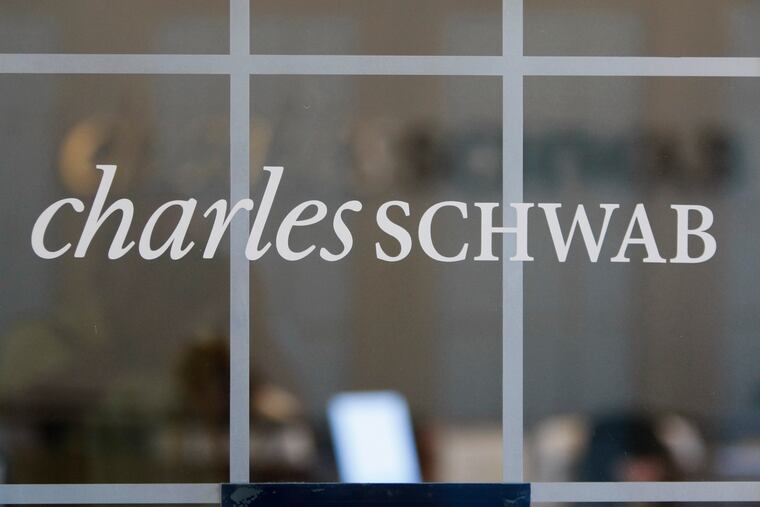Schwab-Ameritrade deal seen drawing tough antitrust review
Although fees are going down for consumers, antitrust officials will focus on whether the deal will mean less competition for the interest paid to investors on their accounts and whether fees on other services could rise, one analyst said.

Charles Schwab Corp.’s plan to buy rival TD Ameritrade Holding Corp. could face tough antitrust scrutiny over a deal that combines two of the biggest companies that run platforms used by independent financial advisers.
The tie-up would create a $5 trillion giant, advancing Schwab’s leading position as custodian for assets managed by financial advisers. That could raise antitrust concerns even as competition among brokerages is driving down fees for investors.
“We think this deal may face somewhat significant antitrust hurdles,” Keefe, Bruyette & Woods’ Kyle Voigt said in a note Thursday.
Schwab is the No. 1 player in the market for safeguarding assets managed by registered investment advisers, followed by Fidelity Investments, Voigt said. Schwab may hold about half of the market, while TD Ameritrade may have around 15% to 20%, he said. TD Ameritrade surged as much as 26% Thursday — the most in 20 years — while Schwab rallied 14%.
Still, the market is fairly fragmented with smaller competitors, and falling management fees have been a boon to investors, a trend that looks unlikely to change, said Bloomberg Intelligence analyst David Ritter.
“It’s hard to imagine that that train is going to be slowed by one merger like this,” he said.
One of the last major deals in the industry — TD Ameritrade’s acquisition of Scottrade in 2017 — won approval from U.S. antitrust officials without conditions. Toronto-Dominion Bank, Canada’s second-largest lender by assets, owns a 43% stake in TD Ameritrade.
Although fees are going down for consumers, antitrust officials will focus on whether the deal will mean less competition for the interest paid to investors on their accounts and whether fees on other services could rise, said Robert Litan, a partner at Korein Tillery and a former official with the Justice Department’s antitrust division. The tie-up will likely be reviewed by the Justice Department, he said, instead of the Federal Trade Commission, which also reviews mergers.
“The intense competition in the industry has forced them to go to zero commissions, but that doesn’t mean that the market still isn’t susceptible to having consumers hurt as a result of further consolidation,” he said.
Cowen analyst Jaret Seiberg said in a note that the takeover will get significant scrutiny from regulators that could stretch into the third quarter of 2020, though he said he expects it will be completed before the next presidential inauguration.
“The concern is that this becomes political,” Seiberg said. “Democratic candidates including Sen. Elizabeth Warren have been railing against big tech and big banks. It is easy to see how this could get drawn into this anti-big business campaign.”
Here’s a sample of other commentary on the deal:
UBS, Brennan Hawken
The very large and surprising deal “carries a lot of execution risk,” particularly regarding legal and regulatory issues, Hawken warned in a note.
Hurdles include the “size the combined entity would represent in the discount brokerage space,” even if regulators were to take into account full-service wealth-management firms like Morgan Stanley and Bank of America Corp., he said. Schwab cutting commissions and then bidding for its “most hindered” competitor might also draw legal challenges and further anti-competitive scrutiny, Hawken said.
Hawken added that E*Trade was “left out in the cold,” and appears vulnerable as it had begun to reflect an M&A premium and the Schwab-Ameritrade tie-up would reduce the number of potential buyers. E*Trade slumped as much as 10% today.
BofA, Michael Carrier
TD Ameritrade’s relationship with holder Toronto-Dominion Bank “creates some complications,” Carrier wrote, including “dis-synergies and a bit tougher regulatory approvals.”
Carrier expects merger discussions and activity in the sector in the near term, which is likely to benefit online broker stocks. He sees the Schwab-Ameritrade deal making “strategic sense” as the two have similar business models, particularly regarding retail and registered investment adviser, or RIA, platforms, and TD Ameritrade lacks a permanent CEO.
Most firms in the sector, including E*Trade, will likely conduct merger talks given the “pressures on the business, this transaction, game theory, as well as the attractive synergies and accretion,” he said. Shares of companies that get left out may face pressure.
Vital Knowledge, Adam Crisafulli
News of Schwab potentially buying TD Ameritrade may weigh on some asset managers as the combined company would be able to exert even more pressure on industry fees, Crisafulli wrote.
National Bank, Gabriel Dechaine
A Schwab deal to acquire TD Ameritrade may be helpful for Toronto-Dominion Bank’s long-term U.S. strategy, according to Dechaine.
Toronto-Dominion may end up with 10% to 15% stake in the combined entity, assuming an “all-stock transaction and no additional deal twists,” he said in a note to clients.
“Assuming a smaller stake in a bigger player situation, TD could have a more liquid asset that it could potentially sell to finance a future U.S. regional bank acquisition,” Dechaine said. “As such, it would make it easier for TD to make future acquisitions accretive.”